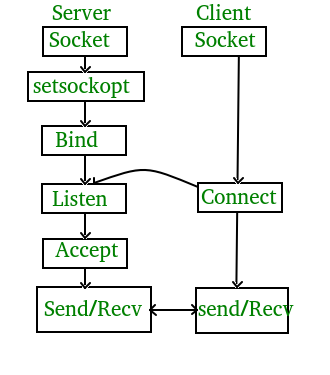
int sockfd = socket(domain, type, protocol)sockfd: socket descriptor, an integer (like a file-handle)
domain: integer, communication domain e.g., AF_INET (IPv4 protocol) , AF_INET6 (IPv6 protocol)
type: communication type
SOCK_STREAM: TCP(reliable, connection oriented)
SOCK_DGRAM: UDP(unreliable, connectionless)
protocol: Protocol value for Internet Protocol(IP), which is 0. This is the same number which appears on protocol field in the IP header of a packet.(man protocols for more details)
int bind(int sockfd, const struct sockaddr *addr,
socklen_t addrlen);
bind function binds the socket to the address and port number specified in addr(custom data structure). In the example code, we bind the server to the localhost, hence we use INADDR_ANY to specify the IP address.
int server_fd, new_socket, valread;
struct sockaddr_in address;
int opt = 1;
int addrlen = sizeof(address);
char buffer[1024] = {0};
char *hello = "Hello from server";
// Creating socket file descriptor
if ((server_fd = socket(AF_INET, SOCK_STREAM, 0)) == 0)
{
perror("socket failed");
exit(EXIT_FAILURE);
}
// Forcefully attaching socket to the port 8080
if (setsockopt(server_fd, SOL_SOCKET, SO_REUSEADDR | SO_REUSEPORT,
&opt, sizeof(opt)))
{
perror("setsockopt");
exit(EXIT_FAILURE);
}
address.sin_family = AF_INET;
address.sin_addr.s_addr = INADDR_ANY;
address.sin_port = htons( PORT );
// Forcefully attaching socket to the port 8080
if (bind(server_fd, (struct sockaddr *)&address,
sizeof(address))<0 code="">
{
perror("bind failed");
exit(EXIT_FAILURE);
}
if (listen(server_fd, 3) < 0)
{
perror("listen");
exit(EXIT_FAILURE);
}
if ((new_socket = accept(server_fd, (struct sockaddr *)&address,
(socklen_t*)&addrlen))<0 code="">
{
perror("accept");
exit(EXIT_FAILURE);
}
valread = read( new_socket , buffer, 1024);
printf("%s\n",buffer );
send(new_socket , hello , strlen(hello) , 0 );
printf("Hello message sent\n");
Listen:int listen(int sockfd, int backlog);
It puts the server socket in a passive mode, where it waits for the client to approach the server to make a connection.
Accept:
int new_socket= accept(int sockfd, struct sockaddr *addr, socklen_t *addrlen);
It extracts the first connection request on the queue of pending connections for the listening socket, sockfd, creates a new connected socket, and returns a new file descriptor referring to that socket. At this point, connection is established between client and server, and they are ready to transfer data.
Setsockopt:
int setsockopt(int sockfd, int level, int optname,
const void *optval, socklen_t optlen);
This helps in manipulating options for the socket referred by the file descriptor sockfd. This is completely optional, but it helps in reuse of address and port. Prevents error such as: “address already in use”.
----------
CLIENTConnect:
int connect(int sockfd, const struct sockaddr *addr,
socklen_t addrlen);
The connect() system call connects the socket referred to by the file descriptor sockfd to the address specified by addr. Server’s address and port is specified in addr.
struct sockaddr_in address; int sock = 0, valread; struct sockaddr_in serv_addr; char *hello = "Hello from client"; char buffer[1024] = {0}; if ((sock = socket(AF_INET, SOCK_STREAM, 0)) < 0) { printf("\n Socket creation error \n"); return -1; } memset(&serv_addr, '0', sizeof(serv_addr)); serv_addr.sin_family = AF_INET; serv_addr.sin_port = htons(PORT); // Convert IPv4 and IPv6 addresses from text to binary form if(inet_pton(AF_INET, "127.0.0.1", &serv_addr.sin_addr)<=0) { printf("\nInvalid address/ Address not supported \n"); return -1; } if (connect(sock, (struct sockaddr *)&serv_addr, sizeof(serv_addr)) < 0) { printf("\nConnection Failed \n"); return -1; } send(sock , hello , strlen(hello) , 0 ); printf("Hello message sent\n"); valread = read( sock , buffer, 1024); printf("%s\n",buffer ); return 0;
No comments:
Post a Comment